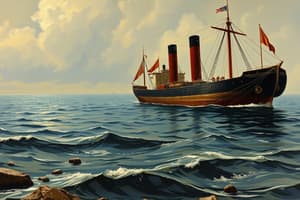Podcast
Questions and Answers
What legal doctrine does the Oil Pollution Act utilize to ensure accountability for oil spills?
What legal doctrine does the Oil Pollution Act utilize to ensure accountability for oil spills?
- Consequential liability
- Vicarious liability
- Strict liability (correct)
- Negligence liability
What is the purpose of the trust fund created by the Oil Pollution Act?
What is the purpose of the trust fund created by the Oil Pollution Act?
- To reimburse oil companies for cleanup costs
- To provide compensation for affected parties
- To finance cleanup when responsible parties are unable to do so (correct)
- To support the construction of new oil storage facilities
Which federal agency is responsible for publishing regulations for oil tankers under the Oil Pollution Act?
Which federal agency is responsible for publishing regulations for oil tankers under the Oil Pollution Act?
- Coast Guard (correct)
- FEMA
- EPA
- OSHA
What disaster prompted the implementation of the Oil Pollution Act?
What disaster prompted the implementation of the Oil Pollution Act?
What do the Spill Prevention Control and Countermeasure (SPCC) regulations require?
What do the Spill Prevention Control and Countermeasure (SPCC) regulations require?
Why were amendments to the Oil Pollution Prevention Regulation proposed after the Floreffe oil spill?
Why were amendments to the Oil Pollution Prevention Regulation proposed after the Floreffe oil spill?
When did the EPA finalize the revisions requiring facility owners to prepare response plans?
When did the EPA finalize the revisions requiring facility owners to prepare response plans?
What is required from oil storage facilities and vessels under the Oil Pollution Act?
What is required from oil storage facilities and vessels under the Oil Pollution Act?
What were the compliance dates for the amendments to the Oil Pollution Prevention Regulation that became final in 2002?
What were the compliance dates for the amendments to the Oil Pollution Prevention Regulation that became final in 2002?
What is the primary focus of Area Contingency Plans as required by the Oil Pollution Act?
What is the primary focus of Area Contingency Plans as required by the Oil Pollution Act?
Which storage capacity of oil products exemptions applies to the SPCC plan?
Which storage capacity of oil products exemptions applies to the SPCC plan?
What is one of the key purposes of an SPCC plan?
What is one of the key purposes of an SPCC plan?
What must be included in an SPCC plan regarding spill control measures?
What must be included in an SPCC plan regarding spill control measures?
Who is required to certify an SPCC plan?
Who is required to certify an SPCC plan?
How often must facilities conduct training related to oil handling according to the SPCC guidelines?
How often must facilities conduct training related to oil handling according to the SPCC guidelines?
What aspect of the SPCC plan must be reviewed and potentially revised before its five-year anniversary?
What aspect of the SPCC plan must be reviewed and potentially revised before its five-year anniversary?
What is a required procedure within the SPCC plan concerning spill events?
What is a required procedure within the SPCC plan concerning spill events?
Which of the following is NOT mentioned as a requirement of the SPCC plan?
Which of the following is NOT mentioned as a requirement of the SPCC plan?
What must happen to amendments made to the SPCC plan?
What must happen to amendments made to the SPCC plan?
What is required in the SPCC plan regarding personnel during a spill?
What is required in the SPCC plan regarding personnel during a spill?
Flashcards
SPCC Plan
SPCC Plan
A written document outlining how a facility prevents, contains, and cleans up oil spills to protect navigable waters and shorelines.
What are the requirements for SPCC plan's certification?
What are the requirements for SPCC plan's certification?
An SPCC plan must be certified by a registered professional engineer.
What is the purpose of an SPCC plan?
What is the purpose of an SPCC plan?
To prevent oil spills into navigable waters and adjoining shorelines, minimizing environmental damage.
SPCC plan review frequency
SPCC plan review frequency
Signup and view all the flashcards
SPCC plan review process
SPCC plan review process
Signup and view all the flashcards
SPCC plan training
SPCC plan training
Signup and view all the flashcards
Exemption from SPCC plan
Exemption from SPCC plan
Signup and view all the flashcards
SPCC plan components
SPCC plan components
Signup and view all the flashcards
SPCC plan: Spill assessment
SPCC plan: Spill assessment
Signup and view all the flashcards
SPCC plan: Spill control
SPCC plan: Spill control
Signup and view all the flashcards
Oil Pollution Act (OPA)
Oil Pollution Act (OPA)
Signup and view all the flashcards
Strict Liability
Strict Liability
Signup and view all the flashcards
What does OPA do for oil spills?
What does OPA do for oil spills?
Signup and view all the flashcards
What does CWA stand for?
What does CWA stand for?
Signup and view all the flashcards
Who is responsible for enforcing the Oil Pollution Act?
Who is responsible for enforcing the Oil Pollution Act?
Signup and view all the flashcards
What was the Floreffe, Pennsylvania oil spill?
What was the Floreffe, Pennsylvania oil spill?
Signup and view all the flashcards
Why were SPCC plan requirements extended for farms?
Why were SPCC plan requirements extended for farms?
Signup and view all the flashcards
What is the role of Area Contingency Plans?
What is the role of Area Contingency Plans?
Signup and view all the flashcards
Study Notes
Oil Pollution Act (OPA)
- Direct response to the Exxon Valdez oil spill in 1989
- Federal liability scheme for vessels and facilities releasing oil in US waters
- "Strict liability" doctrine holds responsible parties liable for damages regardless of fault
- Creates a trust fund financed by a tax on oil for cleanup when responsible parties are unable or unwilling to act
- Requires oil storage facilities and vessels to submit response plans to the Federal government
- Requires development of Area Contingency Plans for regional oil spill response
- Coast Guard regulations for oil tankers, and EPA regulations for aboveground storage facilities
Spill Prevention Control and Countermeasure Requirements
- Section 311 of the Clean Water Act (CWA) prohibits oil and hazardous substance discharges into navigable US waters, adjoining shorelines, or the contiguous zone
- Different zones are defined in the diagram by the document
SPCC Regulations
- Oil Pollution Act Amendments of 1990 required some oil storage facilities to develop Facility Response Plans
- EPA finalized revisions in 1994, requiring plans for worst-case oil discharges
- Revisions following the 1988 Floreffe and 1989 Exxon Valdez spills, finalized in 2002, with compliance dates in 2011 but eventually extended for farms until 2013
SPCC Plan
- Addresses storage of oil in containers 55 gallons or larger, potentially reaching waterways
- Facilities with less than 42,000 gallons of underground oil, or 1,320 gallons above ground are exempt
- A written document outlining how a facility prevents, contains, and cleans up oil spills
- Purpose is to prevent oil spills reaching navigable waters or adjoining shorelines
- The plan should include assessments of spill quantities, pathways reach surface waters, spill control measures, response procedures and personnel, notification requirements, procedures for disposal of spilled materials, and contingency planning
- Plan must be reviewed within 90 days of a five-year anniversary of preparation
- Amendments must be certified by a registered professional engineer
- Facilities must conduct annual training for staff on handling oil/petroleum and response to discharges
Homework
- None
Studying That Suits You
Use AI to generate personalized quizzes and flashcards to suit your learning preferences.




